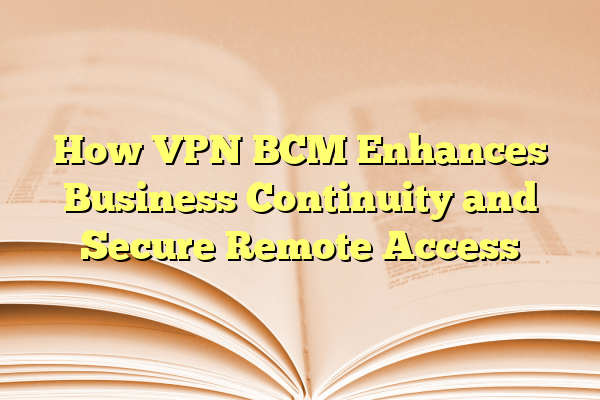
How VPN BCM Enhances Business Continuity and Secure Remote Access
In today’s fast-paced digital landscape, maintaining uninterrupted operations and ensuring secure access to business resources are more critical than ever. The increasing reliance on remote work, cloud services, and global collaboration presents a unique set of challenges in terms of security, uptime, and operational resilience. This is where Virtual Private Network (VPN) Business Continuity Management (BCM) steps in as a crucial enabler of both secure remote access and business continuity.
Contents
Understanding VPN in the Context of Business Continuity
A VPN creates a secure, encrypted connection between a user’s device and the organization’s internal network. It effectively acts as a secure tunnel through which data passes, preventing unauthorized access by masking IP addresses and encrypting transmitted data.
Traditional VPNs were primarily employed to uphold privacy and security in public networks. Today, they play a far more integral role in business operations. By combining VPN technologies with Business Continuity Management strategies, companies can protect critical operations, minimize downtime, and ensure continued productivity during disruptions.

Key Benefits of VPN BCM to Enhance Business Operations
Leveraging VPN as part of a comprehensive business continuity framework offers a range of advantages. Let’s explore how this integration enhances operational stability:
1. Ensures Secure and Reliable Remote Access
Remote work is no longer a novelty—it’s a necessity. Whether it’s a global pandemic or a simple snowstorm, employees must be able to access their work environment from anywhere.
VPNs enable encrypted communication, ensuring that sensitive company data is protected even when accessed from unsecured networks such as home Wi-Fi or public hotspots. VPN BCM ensures that business-critical functions remain fully operational and protected from potential cyber threats.
- Multi-factor authentication (MFA) adds an extra layer of security
- IP whitelisting and split tunneling reduce risks by limiting access to trusted devices and only routing essential traffic
- Geo-restriction control ensures compliance with local data handling laws
2. Reduces Downtime During Disasters
VPN BCM allows businesses to prepare for and respond to various forms of disruption, including cyberattacks, natural disasters, and hardware failures.
By maintaining remote access protocols, redundant servers, and backup data tunnels, VPN-based continuity solutions ensure that employees can still connect to business systems and resources regardless of where they are or what’s happening on-site.
This responsiveness supports a broader BCM goal: minimizing disruptions and maintaining service delivery to clients in the face of adversity.
3. Supports Scalability and Flexibility
Traditional disaster recovery models involve static backups and fixed physical office infrastructure. A VPN-powered BCM system, on the other hand, supports the kind of dynamic, scalable IT environment that modern businesses need.
Whether rapidly onboarding new remote employees or expanding into new territories, VPNs give growing enterprises the secure access pathways required, without incurring huge costs in infrastructure.
Scalability means that companies can adjust bandwidth, user access, and security levels in real-time as demands change—an essential feature for modern business resilience.
4. Enhances Compliance with Industry Regulations
Data protection regulations such as GDPR, HIPAA, and SOX demand stringent security controls, especially when transmitting sensitive data across borders. VPNs support compliance by:
- Encrypting data traffic end-to-end
- Providing detailed access logs for audits and reviews
- Allowing policies to restrict data flows based on jurisdictional boundaries
This makes VPN BCM a vital tool for businesses operating in highly regulated industries.

Real-World Scenario: VPN BCM in Action
Imagine a mid-sized software development company with teams spread across the globe. Suddenly, a massive storm disables one of its main regional offices. Without VPN-enabled business continuity measures, the company could face days of lost productivity and an unhappy clientele.
But with VPN BCM in place:
- Remote co-workers can securely access source code repositories
- Client communications continue through secure VoIP and email portals
- Project managers oversee deliverables via centralized dashboards protected by VPN encryption
Such seamless functionality is the cornerstone of effective business continuity planning in the digital era.
Implementing VPN BCM: Best Practices
Successfully integrating VPN with business continuity planning requires more than just a technical setup. It demands strategic foresight and ongoing management. Here are some best practices:
1. Conduct a VPN Risk Assessment
Assess your current network vulnerabilities and business-critical access points. Identify data flows, third-party access, endpoint device security, and current VPN capabilities. Address the gaps through appropriate security layers.
2. Choose the Right VPN Solution
Select a VPN that fits your organization’s scalability, compliance, and performance needs. Consider options like:
- SSL VPNs – User-friendly, ideal for web-based access
- IPSec VPNs – Better for site-to-site connections with robust security
- Cloud VPNs – Scalable for enterprise-level operations with dynamic IP management
3. Train Staff and Monitor Usage
A VPN system is only as effective as the people who use it. It’s essential to regularly train employees on secure practices such as:
- Using company-issued devices
- Keeping software updated
- Changing passwords and enabling MFA
Additionally, network administrators must monitor VPN usage for irregular activity, bandwidth overloads, or unauthorized access attempts.
4. Regularly Test and Update the VPN BCM Plan
Like all continuity plans, VPN BCM must be tested periodically to confirm its effectiveness. Simulate disaster scenarios, track performance against KPIs, and evaluate employee feedback to make improvements.
Keep software configurations up-to-date and revise access policies as new threats and compliance requirements emerge.
The Future: VPNs and Next-Generation Business Continuity
The world of business continuity is evolving rapidly with technologies like cloud computing, artificial intelligence, and zero trust architecture. The VPN model is expected to adapt accordingly to remain effective.
Future VPN BCM solutions will likely incorporate:
- AI-driven threat detection to identify breaches in real-time
- Seamless integration with cloud workloads for hybrid deployments
- Edge computing compatibility to optimize data flows closer to users
Forward-thinking organizations are already combining VPN with Zero Trust Network Access (ZTNA) models, which require identity verification at every stage of connection—not just at login.
Final Thoughts
As companies navigate an increasingly complex digital world filled with evolving threats and unpredictable disruptions, embracing VPN BCM is no longer optional—it’s strategic. By ensuring secure, scalable, and resilient remote access, businesses not only protect their data and operations but also empower their workforce to thrive in any environment.
Ultimately, investing in VPN Business Continuity Management is investing in a future-proof approach to productivity, security, and success—wherever and whenever work happens.
